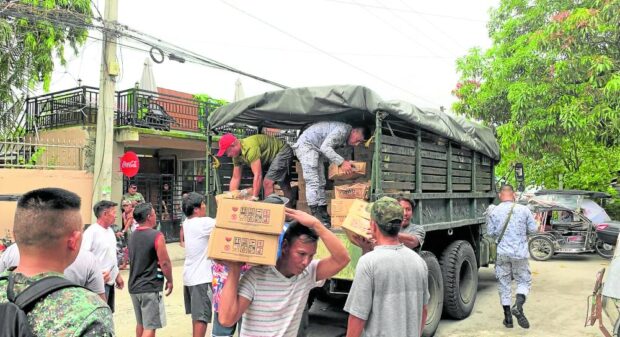War games ease out Zambales fishers anew

ASSISTANCE Residents of Barangay San Miguel in San Antonio, Zambales, on Thursday receive food packs from the Department of Social Welfare and Development as aid after they were barred from catching fish while Philippine and American troops are scheduled to conduct maritime exercises in the town. —JOANNA ROSE AGLIBOT
SAN ANTONIO, ZAMBALES—For three days, fisherfolk and residents in five coastal towns in this province were again prohibited from venturing out to sea as another round of live-fire maritime exercises was scheduled to be held between Philippine and American troops.
Although the war games were only held in the waters off this town on Thursday, the no-sailing policy was enforced from Wednesday to Friday and also covered the nearby towns of San Narciso, San Felipe, Cabangan and Botolan, according to an advisory from the Philippine Coast Guard.
At least 3,500 soldiers from the Philippines and the United States are joining the bilateral training, which will also be held in the provinces of Palawan and Tarlac as part of this year’s Marine Aviation Support Activity between the longtime allies.
According to the Philippine Marine Corps, the drill at sea involved maritime strike and helicopter rope suspension training.
The maritime strike would showcase live-fire maneuvers that would allow participating troops to sink a decommissioned Philippine Navy vessel some 22 kilometers (12 nautical miles) west of Naval Station Leovigildo Gantioqui beach in this town.
Article continues after this advertisementThe Inquirer, however, learned that the maritime strike had to be called off due to poor weather conditions on Thursday.
Article continues after this advertisementThis was the second military drill held by the two armed forces in this province this year. In April, drills under the Balikatan (shoulder-to-shoulder) exercises, the largest edition so far, were also held in this town.
Balikatan had temporarily displaced some 5,000 fishers and their families in the province after they were barred from sailing while the war games were ongoing from April 25 to April 27.
During the April exercises, vessels transiting the waters off the affected towns were also not allowed to sail.
Data from the municipal agriculture office showed that the no-sail zone policy affected at least 1,195 fishermen, fish vendors and other tourism industry workers in this town alone.
On Thursday, they were given food packs containing of 5 kilos of rice, 10 canned goods and 10 sachets of instant coffee as aid from the government.
Joemari Larawan, president of a local fisherfolk group in Barangay San Miguel here, reiterated that they preferred cash assistance so they could buy any food that they want.
“The food aid we got after the Balikatan was just worth about P500,” Larawan told the Inquirer, noting that it came from the provincial government.
Before the Balikatan, the Armed Forces of the Philippines promised to give aid to the affected fisherfolk, but nothing came from the national government.
Collateral damage
Fisherfolk group Pamalakaya reiterated that the livelihood of fishers should not be treated as collateral damage of military drills by Filipino and US troops.
“We find it unacceptable that fishing activities in several coastal towns in Zambales will be prohibited to pave the way for live-fire exercise,” said Bobby Roldan, Pamalakaya vice chair for Luzon, in a separate interview.
“The relief packs distributed to affected fishers can’t replace the loss of income from fishing,” he added.
Pamalakaya also urged the provincial and local governments of Zambales to denounce the fishing ban and uphold the rights of Filipino fishers at all times.
“We will be closely coordinating with affected local fishers to further investigate the impacts of the no-sail zone policy on their livelihood,” Roldan said.
RELATED STORY:
Over 500 PH-US air force troops resume war games after three decades